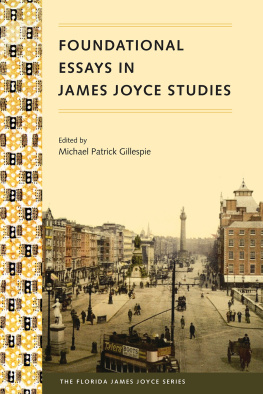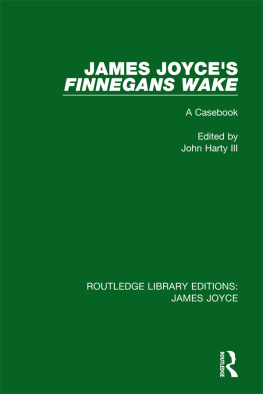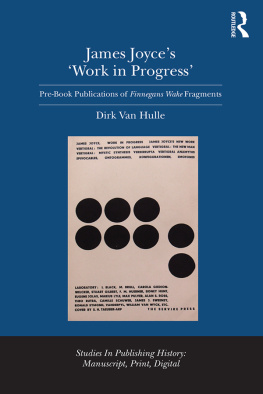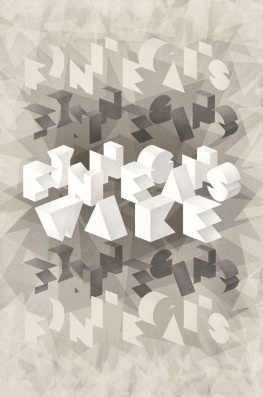Fordham - Lots of fun at Finnegans Wake unravelling universals
Here you can read online Fordham - Lots of fun at Finnegans Wake unravelling universals full text of the book (entire story) in english for free. Download pdf and epub, get meaning, cover and reviews about this ebook. City: Oxford u.a, year: 2013;2007, publisher: Oxford University Press, genre: Romance novel. Description of the work, (preface) as well as reviews are available. Best literature library LitArk.com created for fans of good reading and offers a wide selection of genres:
Romance novel
Science fiction
Adventure
Detective
Science
History
Home and family
Prose
Art
Politics
Computer
Non-fiction
Religion
Business
Children
Humor
Choose a favorite category and find really read worthwhile books. Enjoy immersion in the world of imagination, feel the emotions of the characters or learn something new for yourself, make an fascinating discovery.

- Book:Lots of fun at Finnegans Wake unravelling universals
- Author:
- Publisher:Oxford University Press
- Genre:
- Year:2013;2007
- City:Oxford u.a
- Rating:4 / 5
- Favourites:Add to favourites
- Your mark:
- 80
- 1
- 2
- 3
- 4
- 5
Lots of fun at Finnegans Wake unravelling universals: summary, description and annotation
We offer to read an annotation, description, summary or preface (depends on what the author of the book "Lots of fun at Finnegans Wake unravelling universals" wrote himself). If you haven't found the necessary information about the book — write in the comments, we will try to find it.
Fordham: author's other books
Who wrote Lots of fun at Finnegans Wake unravelling universals? Find out the surname, the name of the author of the book and a list of all author's works by series.
Lots of fun at Finnegans Wake unravelling universals — read online for free the complete book (whole text) full work
Below is the text of the book, divided by pages. System saving the place of the last page read, allows you to conveniently read the book "Lots of fun at Finnegans Wake unravelling universals" online for free, without having to search again every time where you left off. Put a bookmark, and you can go to the page where you finished reading at any time.
Font size:
Interval:
Bookmark:
Finnegans Wake
Unravelling Universals
FINN FORDHAM


Great Clarendon Street, Oxford OX2 6DP
Oxford University Press is a department of the University of Oxford.
It furthers the Universitys objective of excellence in research, scholarship,
and education by publishing worldwide in
Oxford New York
Auckland Cape Town Dar es Salaam Hong Kong Karachi
Kuala Lumpur Madrid Melbourne Mexico City Nairobi
New Delhi Shanghai Taipei Toronto
With offices in
Argentina Austria Brazil Chile Czech Republic France Greece
Guatemala Hungary Italy Japan Poland Portugal Singapore
South Korea Switzerland Thailand Turkey Ukraine Vietnam
Oxford is a registered trade mark of Oxford University Press
in the UK and in certain other countries
Published in the United States
by Oxford University Press Inc., New York
Finn Fordham 2007
The moral rights of the author have been asserted
Database right Oxford University Press (maker)
First published 2007
All rights reserved. No part of this publication may be reproduced,
stored in a retrieval system, or transmitted, in any form or by any means,
without the prior permission in writing of Oxford University Press,
or as expressly permitted by law, or under terms agreed with the appropriate
reprographics rights organization. Enquiries concerning reproduction
outside the scope of the above should be sent to the Rights Department,
Oxford University Press, at the address above
You must not circulate this book in any other binding or cover
and you must impose the same condition on any acquirer
British Library Cataloguing in Publication Data
Data available
Library of Congress Cataloging in Publication Data
Data available
Typeset by Laserwords Private Limited, Chennai, India
Printed in Great Britain
on acid-free paper by
Biddles Ltd., Kings Lynn, Norfolk
ISBN 9780199215867
1 3 5 7 9 10 8 6 4 2
For Max, Taddy, Cato, and Jason,
with love
Joyces last novel is often conceived as multi-authored, a tissue of quotations, a social text of sorts, so I am particularly aware of the extensive roles others have played in the long compositional journey of my ownor I should say ourbook. There are too many to thank if these acknowledgements are to be exhaustive: first of all there is the Leverhulme Trust and University College Northampton for generous funding; then my inspiring teachers Maud Ellmann, Steven Connor, and Peter Brooker for having spurred, supervised and supported my doctoral and postdoctoral research; the geneticists Sam Slote, Luca Crispi, Dirk van Hulle, Ingeborg Landuyt, Wim van Mierlo, Geert Lernout, and Daniel Ferrer who help form an exemplary network of mutually supportive scholarsa high five to all of them (simultaneously); the Charles Peake Ulysses reading group in London for its model exegetical practices, especially those of Andrew Gibson and Joe Brooker; the readers and Wakeans Patrick McCarthy, Sheldon Brivic, and Derek Attridge for invaluable suggestions regarding an earlier version of the manuscript; Andrew McNeillie, Rowena Anketell, and Lizzie Robottom at OUP for their grace and energy in publishing my work; Rohan Crowley for in dispensable help with the Index; Kasia Bazarnik and Zenon Fajfer, Carl and Agnieszka Ginko-Humphreys, Jason Cato, Ann, and Milo Fordham, Ruth MacLennan and Robin Banerji for providing pleasure, critical stimulation, and a sense that Joyce can flourish outside academia; Christopher and Mary Warman and Max and Taddy Fordham for always cheerfully helping the homeless at various crucial moments; and last but not least, indeed, above all: Leo, Viola, and especially Caroline, without whom
As Joyce said to those around him with his book almost done: You have all written this book.
Except, of course, any of its mistakes, for which I claim sole authorship.
| EJS | European Joyce Studies |
| FW | Finnegans Wake, 3rd edn. (London: Faber & Faber, 1975) |
| JJA | James Joyce Archive, ed. Michael Groden et al. |
| JJQ | James Joyce Quarterly |
| JSA | Joyce Studies Annual |
| LI | Letters of James Joyce, vol. i, ed. Stuart Gilbert |
| LII | Letters of James Joyce, vol. ii, ed. Richard Ellmann |
| LIII | Letters of James Joyce, vol. iii, ed. Richard Ellmann |
I have attempted to develop ways of presenting the manuscript text in a transcribed form so as to make the base text and the changes relating to it as transparent as possible. I hope the results speak for themselves. Nonetheless, here are some of the principles and strategies Ive made use of. There are two styles of transcription. The first (and most frequent) involvesI have combined three adjacent levels of revision as one level. This is because the revisions may be scanty and scattered over a lengthy passage, and it is not worth copying out the whole three times when only one or two words are being added.
The devil is in the detail
(popular saying)
God is in the detail
Ludwig Wittgenstein and Mies van der Rohe
Finnegans Wake has been described and describes itself in many ways. Since it fell easily into making lists, here is an easily extendable reel of descriptions. It is
a sleep-story; the dreamlike saga of guilt-stained, evolving humanity; a protracted nightmare; a mighty allegory of the fall and resurrection of mankind; a gigantic epiphany of mankind; an ark to contain all human myths
Finnegans Wake for Fritz Senn is what we do with it. But it is also what it does with us. We produce a wake by the way we steer, but we also steer by the Wake that we produce.
of reproductions.
No first draft was ever allowed to settle in its primary state. Joyce returned to them all, and bombarded his writing with more writing. Most passages underwent copious levels of revision and layering. The text seems to be lacqueredthough this turns out to be an inadequate metaphor, for in a method of supplementation like Joyces we actually get to see most of the material
How might you begin writing a universal history, if you were introducing the story of humanity to an alien? With Adam and Eve, perhaps. But that, paradoxically, is both too well known and too easily discredited. How about using the facts that archaeology unearths concerning the cultivation of grain or the earliest city? Thats more scientific but might lack drama. Couldnt we have something to match the histrionics of Genesis? What about evolution, the discovery of fire, the wheel, or the lever, and the subsequent clash between tribesNeanderthals and Homo sapiens? Stanley Kubrick used these elements in his film 2001, implying a history of the world through technological discoveries and it makes great drama, but it also produces a conflictual view of human nature: that were here to manipulate and fight, and that progress comes through the exercise of ever-improving power tools. One consideration in your choice, therefore, is that the beginning may determine the end and structure the narrative. Once you have started there is no going back. Since you do not know what happened, you might as well just make it up: choose a character and let it roll from there. But that hardly helps to limit your choice. So how would you begin?
Font size:
Interval:
Bookmark:
Similar books «Lots of fun at Finnegans Wake unravelling universals»
Look at similar books to Lots of fun at Finnegans Wake unravelling universals. We have selected literature similar in name and meaning in the hope of providing readers with more options to find new, interesting, not yet read works.
Discussion, reviews of the book Lots of fun at Finnegans Wake unravelling universals and just readers' own opinions. Leave your comments, write what you think about the work, its meaning or the main characters. Specify what exactly you liked and what you didn't like, and why you think so.




